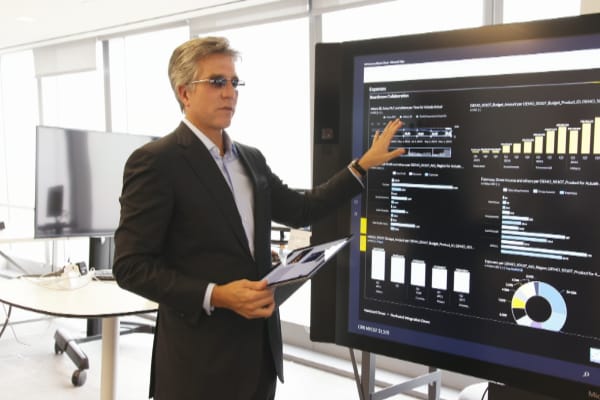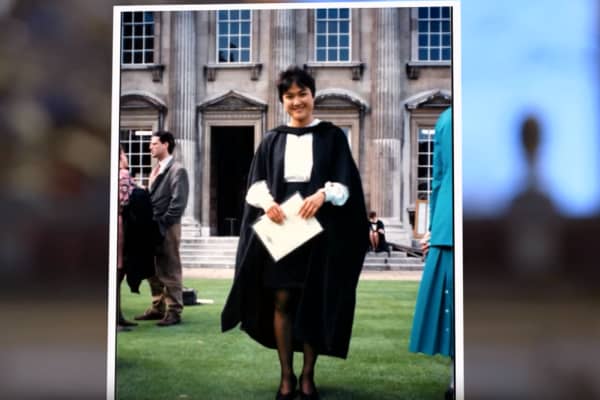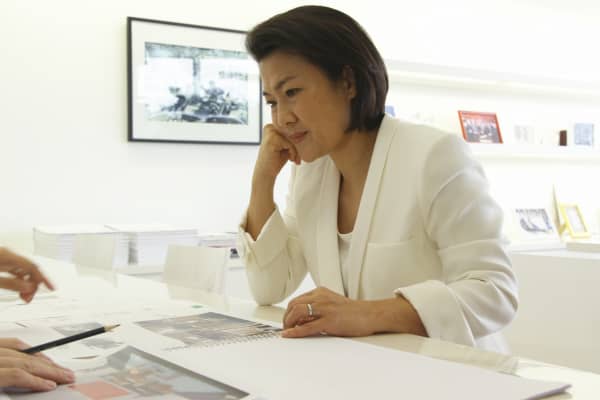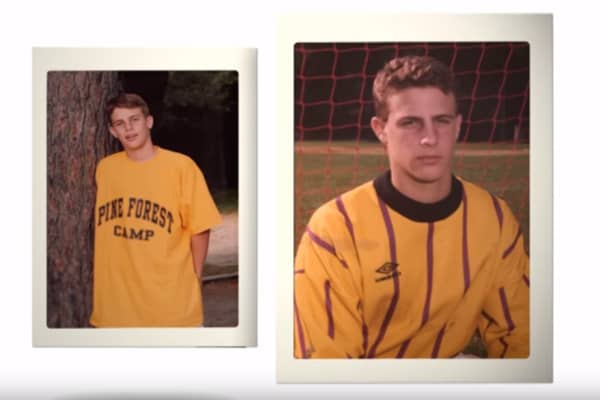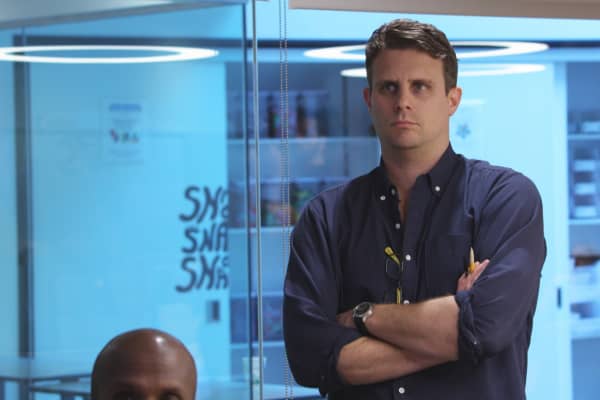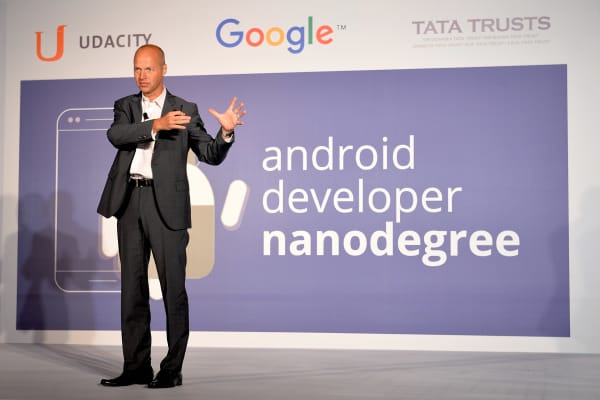The teenage years aren’t always the smoothest, and life was no different for four of the world’s most successful chief executives.
They may be heavy hitters now, but before they made it, they included an awkward adolescent, a teen factory worker, a “terrible” student and a 16-year-old who held three jobs.
Bill McDermott, now CEO of software giant SAP, loved the scent of success as an adolescent. Having the gumption to buy a business is impressive at any age, but McDermott snapped up his neighborhood delicatessen for $5,500 — at the age of 16.
It wasn’t bankrolled by his mom and dad: He’d been working since the age of 11, and by the time he bought the Amityville Country Delicatessen, Long Island, he also was running a paper route and waiting tables.
“I was actually simplifying my life. I had three part-time jobs. One of them, of course, at that time was the deli itself,” he told CNBC’s TV show “The Brave Ones.” “So I had a little bit of an inside scoop on how to work the deli. But how I did it was simple. The owner of the business wanted out, so there was a good motivation. And he was willing to trust me, because no one else wanted to buy it.”
The teenage businessman
The teenage McDermott had built relationships with the store’s vendors and got his first orders on consignment. He also got to know his customers well. “One of the interesting little nuances of that deli is 500 people come in and out every day and getting to know them.
“You see, I had a very interesting CRM (Customer Relationship Management) system back then. You know what it was? It was a window. And I could look through that window and I knew everything about my customers.”
McDermott saved enough money to put himself through college, buy cars, clothes and insurance. He also learned how to be a great salesperson. He got a job at Xerox at 21, and by 24 was a sales manager, the youngest applicant for the job at the time. Eventually he joined SAP, becoming president of global sales at its Asia-Pacific and Latin America divisions before becoming joint CEO in 2010 and sole CEO in 2014. So what did that teen experience teach him?
“It goes right back to that deli or walking the (Xerox sales) beat in Manhattan door to door. If you can help the customer get what they want, they will help you get what you want. But you gotta get the ordering of those priorities right,” he told “The Brave Ones.”
A rags-to-riches tale
Money was also a motivator for the teenage Zhang Xin, now the billionaire CEO of real estate company SOHO China. Growing up in Beijing under the Mao regime, her family had little, so when she moved to Hong Kong as a teenager, she was determined to make a better life for herself.
It did not come easy: She worked in factories for five years. “We did not know what other way to live, than just finding whatever job was out there to make a living,” she told “The Brave Ones.” And even though her work was monotonous, it gave her a freedom she’d never had. “I really felt free in Hong Kong … I could buy anything I wanted to buy. I could eat anything I wanted to eat. And I could wear anything I wanted to wear.”
As a sweatshop worker, a big personal motivation was to make more money, so she moved from job to job to get small raises, dreaming of making enough to leave.
Her parents “worked for the government as intellectuals. So working in the factory was never my ambition. And I knew that I had to do that, because I need(ed) to make a living. But I also knew that I would look for any opportunity to get out of it,” she said. After work, Zhang would go to night school, and finally made enough money to move to the U.K., where degrees at Sussex and then Cambridge University were partly funded by grants and scholarships.
After a stint in finance, Zhang set up real estate developer SOHO Chinawith husband Pan Shiyi, and their net worth is now around $3.6 billion.
The advice she would give her younger self? “Oh, just go for it. Go for your dream, whatever dream you have. And don’t (be) worried about (what) people think. (If they say) ‘This is ridiculous,’ often it’s the most ridiculous ideas that turn out to be the best.”
Crazy dreams
A ridiculous idea turned out to be the making of entrepreneur Michael Dubin, who started subscription razor company Dollar Shave Club from his apartment in 2012, knowing nothing about the business of shaving. He sold it to Unilever for $1 billion in 2016, remaining as CEO.
Friend Ben Jacobsen told “The Brave Ones” that this “relatively hair-brained idea” was initially dismissed by many. “There were a hell of a lot more people that told him that this was a foolish idea that he should quit, that he shouldn’t waste his time or money.”
Dubin’s high school years didn’t exactly pave the way for success, his mom Nancy Dubin said.
“He started out high school in the local public high school. And it wasn’t the first time that reports were sent home that he was the class clown. That he’s never going to amount to anything was one of the conferences that we went to,” she said.
“If things interested him, he was a fabulous student. If it was a subject that didn’t interest him at all he was probably a terrible student,” she said.
Yet it was that clowning around that helped Dubin score a hit with his first commercial for Dollar Shave Club. He wrote and starred in “Our Blades are F—ing Great” in 2012, a YouTube ad that has now been watched almost 25 million times.
The teen geek
While Dubin was the class clown, scientist and Google X founder Sebastian Thrun was more of a nerdy teenager, spending his spare time programming a Texas Instruments TI-57 calculator.
“Between (the) age of maybe 12 and 14, I spent every afternoon programming it. It has 50 steps, so it memorizes keystrokes. And I programmed video games. I programmed geometric calculations and all kinds of stuff,” he said.
“I am an odd bird. Maybe I’m socially challenged or what have you. But at a time when computers weren’t used by anybody, I came across this programmable calculator … And I developed a passion for lying in bed and just figuring out what can you do with 50 programming steps.”
As a teen, Thrun admitted that he preferred the company of machines. “At the time, it was intriguing that there was something around me in my world, (and) when I told it to do something it actually did it, right? Because everyone else around me, my parents, my siblings, and so on, I would say, ‘Do this,’ and they would never do it.”
He eventually got a real computer around the age of 16.
“Then something bizarre happened. I kind of lost interest a little bit … I became more interested in people. And I almost felt that while computers do exactly what you tell them to do, that’s what makes themboring. I think the nuances of human interaction (are) a much more interesting thing.”
The blend of human traits and computer science led Thrun to become a professor of robotics and artificial intelligence before winning a self-driving car race across the Mojave Desert, founding Google X and eventually quitting to start online education business Udacity.
























